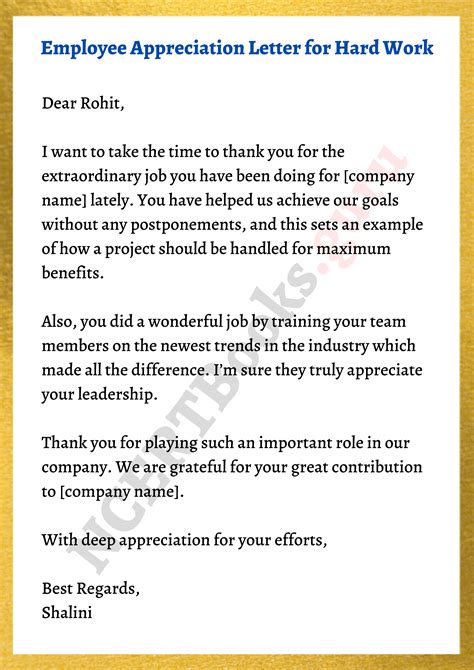Appreciation Letter Tips + Examples

Expressing gratitude can go a long way in building relationships and strengthening connections. A well-written appreciation letter can make someone feel valued and appreciated, whether it’s for a job well done, a kind gesture, or simply being a supportive friend. In this post, we’ll provide tips and examples for crafting a heartfelt appreciation letter that will leave a lasting impression on the recipient.
Why Write an Appreciation Letter?
Showing gratitude is a fundamental human need that can boost morale, increase motivation, and foster positivity. Appreciation letters are a tangible way to express your gratitude and acknowledge someone’s contributions, efforts, or support. They can help build trust, deepen connections, and create a sense of belonging. Whether you’re thanking a colleague, a friend, or a family member, an appreciation letter can make a difference in their day.
What to Include in an Appreciation Letter
A Personalized Greeting
Start your letter with a warm and personalized greeting that addresses the recipient by name. Use their title and last name if you’re writing to a professional contact, or their first name if it’s a personal letter. Avoid using generic phrases like “To Whom It May Concern” as they can come across as impersonal.
A Specific Reason for Appreciation
Be clear about the reason for your appreciation and what the recipient did that you’re thankful for. Mention a specific project, task, or action that impressed you and explain how it made a difference. This will show that you’ve taken the time to reflect on their contributions and that you value their efforts.
A Genuine Expression of Gratitude
Express your gratitude sincerely and authentically. Use words that convey your appreciation and convey your emotions. Avoid vague or clichéd phrases and be specific about what you’re grateful for. For example, instead of saying “Thank you for your help,” say “I’m grateful for your willingness to go above and beyond to help me with this project.”
A Personal Touch
Add a personal touch to your letter that shows you care about the recipient as an individual. Mention something you admire about them, share a personal anecdote, or offer a compliment. This will show that you see them as more than just a colleague or friend.
A Closing and Signature
Close your letter with a warm and friendly closing that reflects the tone of your letter. Use a phrase like “Warm regards,” “Sincerely,” or “With gratitude,” followed by your signature. If you’re writing a professional letter, include your full name, job title, and contact information.
Example Appreciation Letters
Appreciation Letter to a Colleague
Dear [Name],
I wanted to take a moment to express my sincere appreciation for your outstanding work on the [Project Name] project. Your dedication, attention to detail, and willingness to go above and beyond have been invaluable to our team. Your contributions have not gone unnoticed and I’m grateful for the impact you’ve made.
Thank you for taking the initiative to [specific action] and for your unwavering commitment to delivering high-quality work. Your creativity and problem-solving skills have been a true asset to our team and I look forward to continuing to work with you in the future.
Again, thank you for all that you do. Your hard work and dedication are truly appreciated.
Warm regards,
[Your Name]
Appreciation Letter to a Friend
Dear [Name],
I just wanted to take a moment to let you know how much your friendship means to me. Your unwavering support, kind words, and infectious positivity have been a source of inspiration for me during some challenging times. You have a unique ability to make me feel seen and heard, and I’m grateful for your presence in my life.
Thank you for being there for me when I needed a listening ear, for making me laugh when I needed a pick-me-up, and for always being your authentic and wonderful self. You are a true gem and I feel lucky to have you as my friend.
With gratitude,
[Your Name]
FAQs
How do I know when to write an appreciation letter?
You can write an appreciation letter anytime you want to show someone that you value their contributions, efforts, or support. Some common occasions include after a job well done, for a kind gesture, or simply to express gratitude for someone’s presence in your life.
What should I avoid when writing an appreciation letter?
Avoid being vague or generic in your language, and don’t use a template or copy-and-paste from previous letters. Make sure your letter is specific to the recipient and the reason for your appreciation. Additionally, avoid using overly formal or stilted language, as this can come across as insincere.
What if I’m not good at expressing my emotions in writing?
It’s okay if you’re not a natural writer or find it difficult to express your emotions in words. The most important thing is to be sincere and authentic in your appreciation. You can also use examples or anecdotes to illustrate your points and show the recipient what you’re grateful for.
Do I need to send a physical letter or is an email okay?
It’s up to you whether you want to send a physical letter or an email. A physical letter can be more personal and memorable, but an email can be more convenient and timely. Consider the context and the recipient’s preferences when deciding which format to use.
How can I make my appreciation letter stand out?
You can make your appreciation letter stand out by being specific, sincere, and personal. Mention a specific reason for your appreciation and explain how it made a difference. Use language that conveys your emotions and avoid clichés or generic phrases. Add a personal touch that shows you care about the recipient as an individual.
Writing an appreciation letter is a simple yet powerful way to show someone that you value and appreciate them. By following these tips and examples, you can craft a heartfelt and memorable letter that will make a difference in someone’s day.
